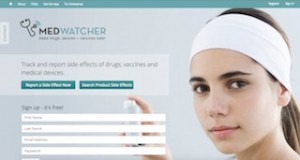 MedWatcher, a tool for adverse event reporting, that the FDA worked on with Epidemico.
MedWatcher, a tool for adverse event reporting, that the FDA worked on with Epidemico.
Google met with the FDA last month to discuss the possibility of the FDA using Google search data to learn about drug side effects, according to a report in Bloomberg, which spotted a public record of the meeting and secured additional information from an FDA spokesperson. The talk appears to have been an informal, early-stage discussion on a topic in which the FDA has shown a steady increase in interest in recent years.
The clinical drug trials that FDA requires are designed to detect and catalogue side effects, but they are prone to miss certain categories of adverse effects -- ones that effect a small, specific subset of the population that wasn't included in the trial group, or long-term effects that take a long time to surface, for instance. They also don't always catch adverse interactions between drugs.
Currently, the FDA tries to catch the adverse event data that slips through the cracks in a number of ways including MedWatch, the FDA’s voluntary reporting system, and the Sentinel Initiative, which consists of partnerships with health insurers and electronic medical records to get access to their aggregated data sets. The agency also recently announced a partnership with PatientsLikeMe, to potentially introduce patient-generated data into that mix.
Public search data could be a particularly good addition because it doesn't limit itself to a self-selecting population like social media and voluntary reporting approaches do, or to people who end up in the hospital like Sentinel. Search data can indicate that people who search for a specific drug are more likely to also search for a side effect, which could clue the FDA into an adverse event they weren't aware of before. But parsing search data to create meaningful reports is a challenge.
Bloomberg reports that Evgeniy Gabrilovich, the Google scientist who sat in on the FDA meeting, cowrote a paper on the subject two years ago in JMIR, though it was based on Yahoo search rather than Google (Gabrilovich worked at Yahoo at the time). Additionally, Bloomberg writes, a Microsoft research team that also claims to be working with FDA wrote a 2013 paper finding that "web search data could have exposed the adverse interaction between the antidepressant Paroxetine (aka Paxil) and cholesterol-lowering drug Pravastatin, which together can cause hyperglycemia, or high blood sugar."
The FDA is also working with Boston Children's hospital spin-off Epidemico to parse Twitter for adverse drug reactions. Once tweets are identified as being adverse events reports, the product tweets back at users and prompts them to fill out a more complete report. This is based on research published by Boston Children's researchers published last year. They've also developed a mobile app for adverse event reporting called MedWatcher.












